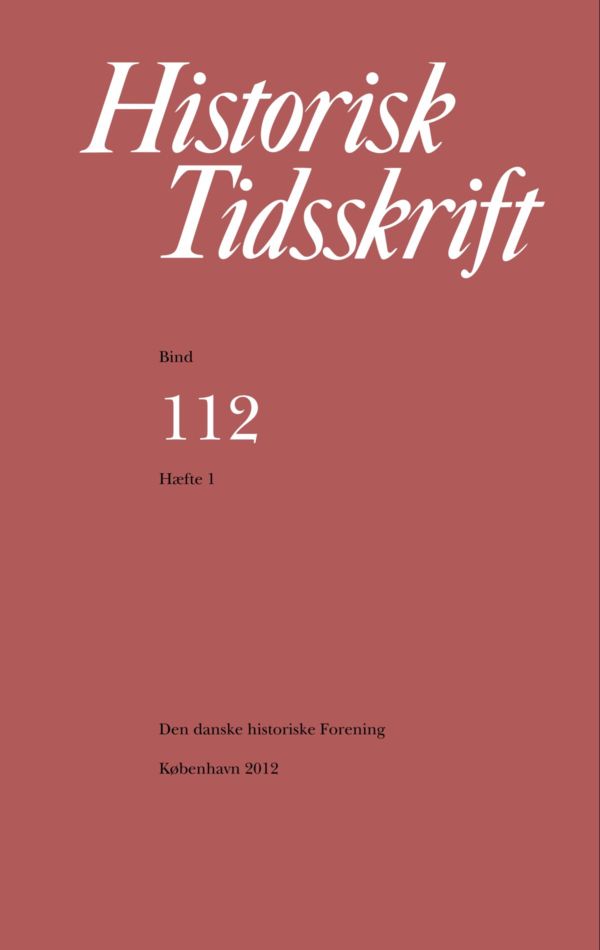Nationale meningsfællesskaber. Danskernes reception af radionyheder om krig og krigsbegivenheder under 2.Verdenskrig
DOI:
https://doi.org/10.7146/ht.v112i1.56550Resumé
The Formation of a Likeminded National Community The Danish Radio Audience and its Reception of News about the War, 1939-45During the Second World War, radio broadcasting was an all-important media for spreading propaganda and shaping public opinion in all countries: the warring parties as well as occupied or neutral nations. In this field as in several others, Denmark was a special case. Even under German occupation, listening to foreign broadcasts was never banned and the occupying force did not confiscate receiver sets. The audience could switch between transmissions in Danish from several countries. From the point of view of Radio Denmark, the statecontrolled station, the situation actually represented a breach of its traditional quasi-monopoly. Only very few reception studies are available, especially as quantitatively based inquiry into listening habits is virtually non-existent for this period. The present study is based on a number of personal diaries, kept by individuals who committed some of their time to discussing the broadcast sources they used for hearing news on the war. The dominant discourse among listeners ran in a national mood. On the other hand, listeners framed their decoding and interpretation of messages according to the distinct main possibilities described in media theory: dominant, negotiated, or oppositional. Before the German occupation, effective April 9, 1940, listeners generally placed confidence in »The News«, one of Radio Denmark’s main programmes, broadcast several times a day. In conformity with the self-perception of the institution, listeners considered the programme neutral and reliable, that is, their decoding of the message was in the dominant mode. After April 9, Radio Denmark was placed under German control, and more rigorously so as time went on. From the very beginning, information on the war was limited and twisted due to German requests. This however, was easily seen through; consequently, Radio Denmark’s news about the war were regarded with suspicion by a vast majority of listeners, whereas other programmes were still able to meet the demand for collective cultural manifestations of national solidarity and unity. Regardless of the sceptical attitude, listeners still bothered to compare The News from Radio Denmark with the news coverage by Swedish and British broadcasters, and many Danes applied, on this comparative basis, a negotiated interpretation of what they heard on the radio, informed by their own basic attitude towards the war and the belligerents. In later stages of the war, typically in the course of 1943, an overwhelming majority of listeners began to interpret BBC’s broadcasts in Danish in the dominant mode. An initial scepticism regarding the veracity and reliability of the information was superseded by a basic attitude of patriotism, and, accordingly, support for the Allies – and somewhat later even for the Resistance. Obviously, the same attitudes prevailed in the broadcasts from London, gaining BBC a wider and wider audience among Danes. In turn, the now very much restricted flow of information from Radio Denmark was interpreted in the oppositional mode, as it was perceived to represent the adversary view. At that point, the primary purpose of listening to the radio was to consolidate individual affiliation to the national community of likeminded patriots.Downloads
Publiceret
Citation/Eksport
Nummer
Sektion
Licens
Ophavsret til bidrag i Historisk Tidsskrift tilhører forfatterne og Den danske historiske Forening som udgiver af Historisk Tidsskrift. For illustrationer gælder den ophavsret, som står anført i billedteksten. Ophavsretslovens almindelige bestemmelser gælder, hvilket vil sige, at ophavsretten gælder i 70 år efter forfatterens død. Bidrag i Historisk Tidsskrift må derfor, med forbehold for en ”moving wall” på tre år, frit downloades, læses, gemmes, anvendes og citeres (med kildeangivelse) i privat og videnskabelig sammenhæng, men de må ikke helt eller delvis genudgives af tredjepart, heller ikke i redigeret form, uden tilladelse fra forfatterne og Den danske historiske Forening. Henvendelse skal i så fald rettes til Historisk Tidsskrifts redaktion på histtid@hum.ku.dk.





